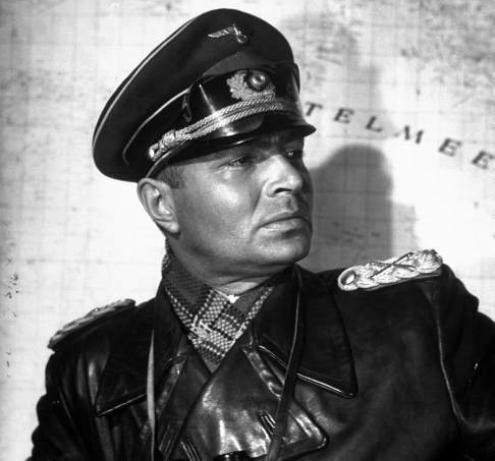The Desert Fox (1951)

The fact is not lost on me that this column is posting on June 6, the 67th anniversary of D-Day — quite possibly the most pivotal day in the history of mankind. If the Allied invasion at Normandy had failed, there's no telling the dark path down which humanity might have been set.
The man charged with defending the German beach defense was Erwin Rommel, regarded by many of his enemies as the finest military mind of his generation. His exploits in North Africa are legend, and if he hadn't spent most of his time fighting with one or more arms tied behind his back — short on men and weapons, and under the thumb of a madman — Rommel might well have resisted the invasion by British and American forces.
It is strange that figures such as Winston Churchill felt compelled to memorialize the man who briefly held the fate of the world in his hands, but such are the vagaries of war. Had Rommel been able to direct the defenses to his own design, we might be spitting his name as a vile oath now.
The film about him, "The Desert Fox: The Story of Rommel," is a muddled mess. Despite the title, there is little to nothing in the way of narrative about his African exploits — the way his tanks commanded the desert and how he himself acquired an almost supernatural reputation for avoiding harm.
Call me a literalist, but a biopic that does not even touch on the defining period in a man's life is doomed from the start. Imagine "The Spirit of St. Louis" confined to Charles Lindbergh's life after his historic Atlantic flight.
The story opens with the failed mission by some British stealth soldiers to assassinate Rommel. Then there's a brief sequence about Desmond Young, the English colonel who briefly met Rommel while a prisoner of war. Young, playing himself (though his supposed narration was dubbed by an actor), returned to Germany after the war to find out the truth about Rommel's death. His book formed the basis of this movie, adapted for the screen by Nunnally Johnson and directed by Henry Hathaway.
The purpose of the book and movie is not to tell the complete story of Rommel's life but to set the historical record straight about his death. To wit: Rommel did not die of a heart attack or succumb to war wounds, as Hitler's Nazi regime reported to the German people, but was forced to commit suicide in retaliation for Rommel's tacit approval of the failed assassination attempt of Hitler.
As Germany's most celebrated soldier, the revelation of Rommel's participation would have been a tremendously demoralizing blow, Hitler's cronies felt. Never mind that Rommel didn't actually collaborate with the assassins and, in fact, was hospitalized in a coma after his car was strafed by enemy airplanes at the time Hitler's bunker was bombed.
Faced with certain conviction, public humiliation and a painful death by garroting, Rommel still demanded a public trial — until Hitler's henchmen warned that his wife (soulfully played by Jessica Tandy in an undersized part) and son (William Reynolds) would not be spared. Faced with no choice at all, Rommel agreed to be driven to a remote forest, swallow a cyanide capsule and let the lie about his death be spread.
This should be riveting stuff, and if the entire movie were about Rommel's last days and his final choice — to die a good soldier — it might have been better for it. Perhaps the film could start with the presentation of Rommel's stark decision, and flashbacks to his life would paint a picture of why he could only arrive at the choice he did.
But I learned from Gene Siskel way back when that a reviewer should criticize a movie for what it is, not for what it is not. So rather than wishing for the film that might have been made about the life of the Desert Fox, I can merely express my disappointment at the one they did.
James Mason plays Rommel, his hair cropped so short his fleshy scalp peeks through, in a performance of clipped diction and ramrod-straight posture. Mason plays Rommel as a man so consumed by his sense of duty, and to an Old World sense of chivalry about the gentlemanly art of war, that he refused to act upon the clear evidence before him. The man who could have best ensured an orderly transition from the insanity of Hitler's regime to peace was simply incapable of an overt act of treason.
It's the credo of Edmund Burke, writ large: "All that is necessary for the triumph of evil is that good men do nothing."
Alas, all that is necessary for a bad film to be made is for people with good intentions to muddle their way through without a clear sense of purpose. "The Desert Fox" bounces around from Africa to Normandy to Berlin, skipping over months and even years at a time without much rhyme or reason to it.
The film reaches a comically awful low point when Rommel confronts Hitler as one final test for himself before he throws in with the conspirators. Luther Adler plays Hitler as a prissy, chubby little joke of an enfant terrible. That works fine for "The Great Dictator," but for a drama like this, Hitler should be unnerving and terrifying — more Bruno Ganz in "Downfall."
"The Desert Fox" is a well-meaning but ultimately wrong-headed account of a great man who was a product of his time.
2 Yaps



